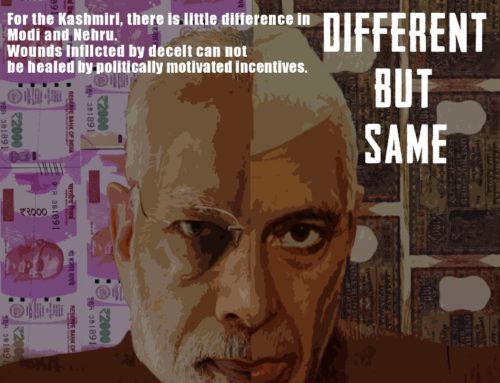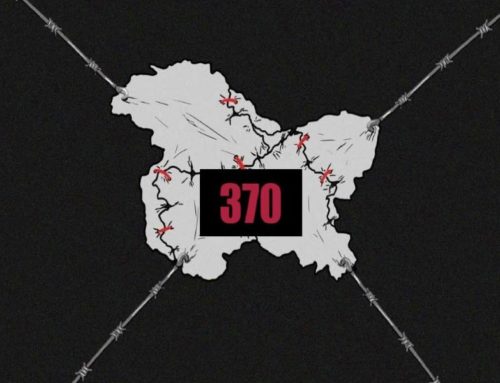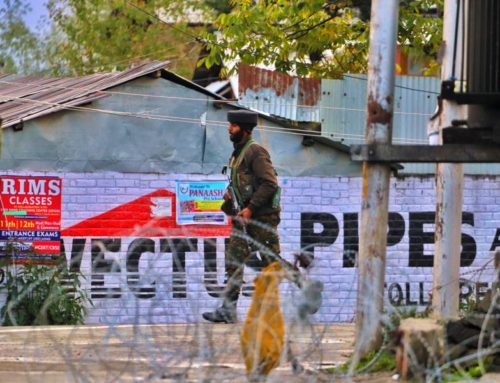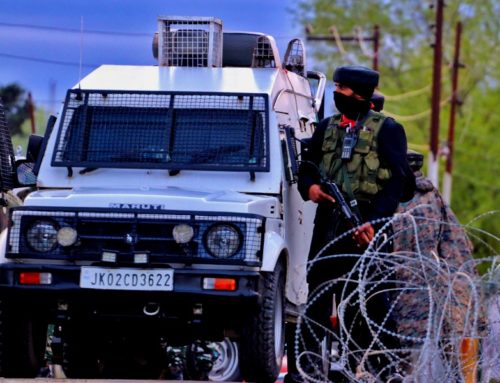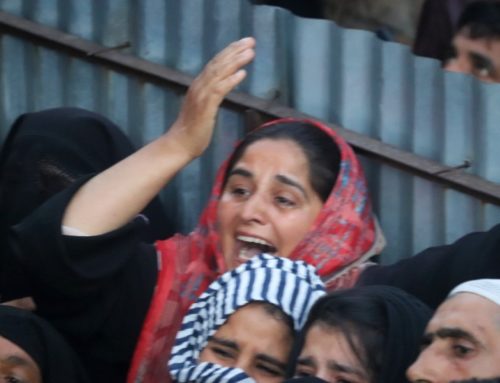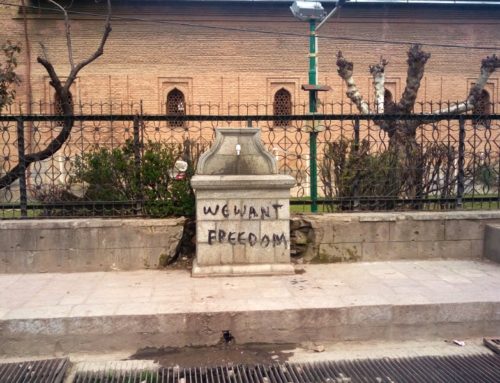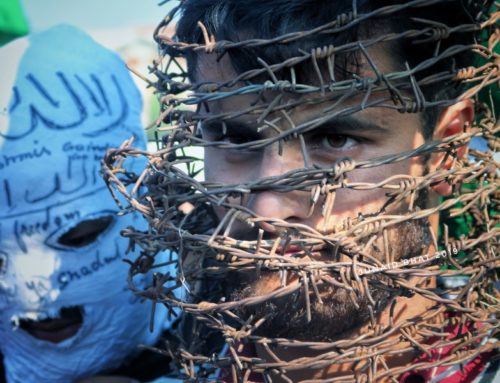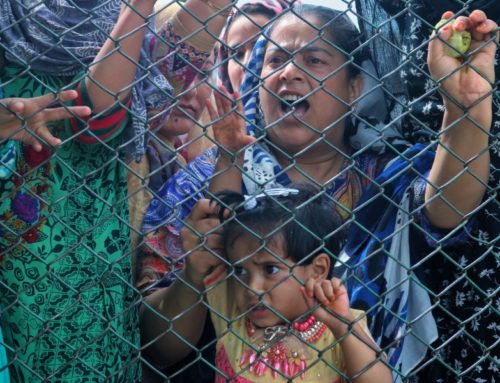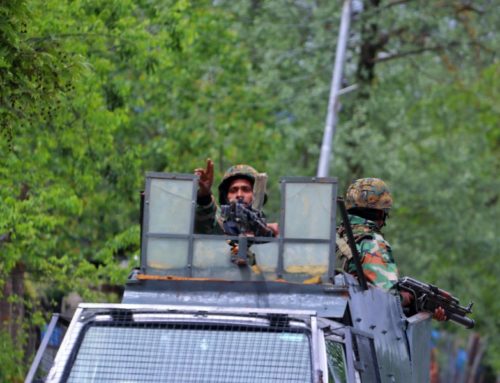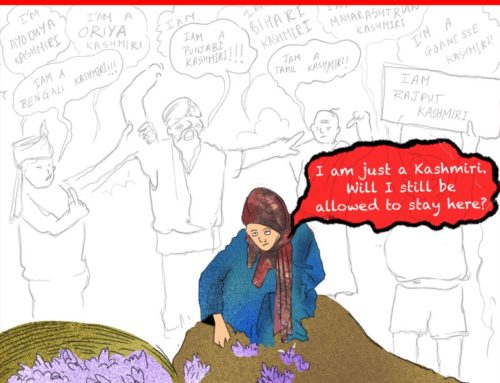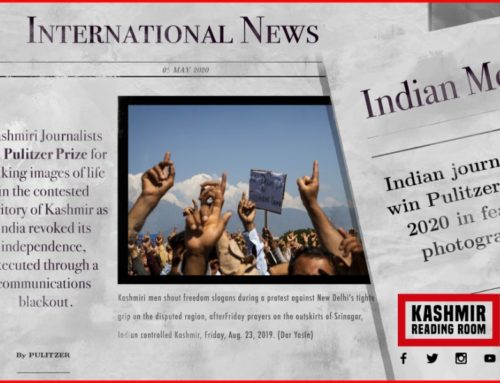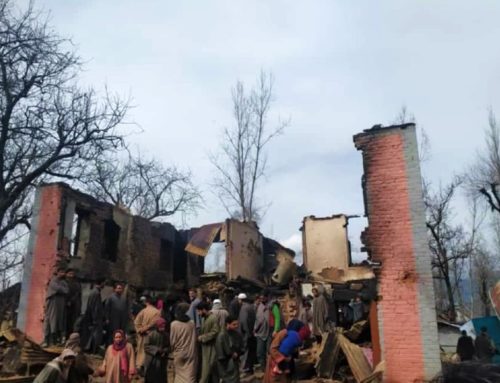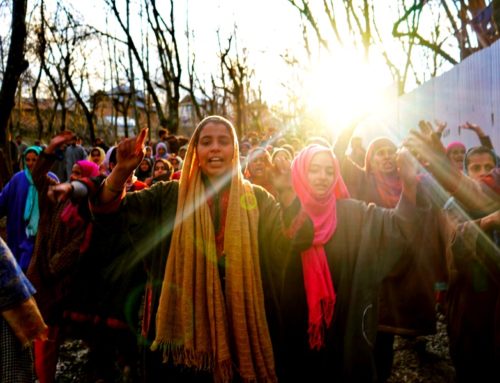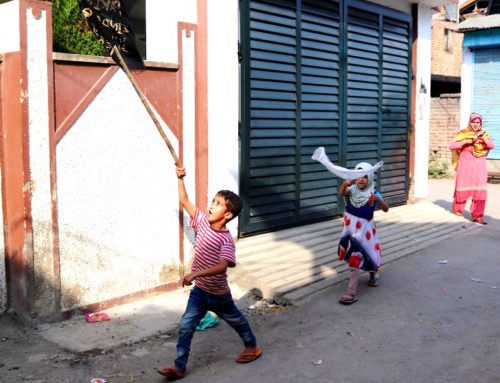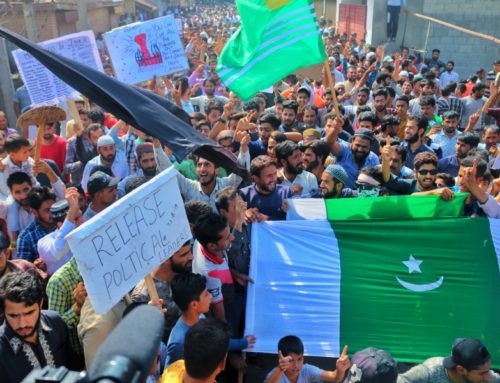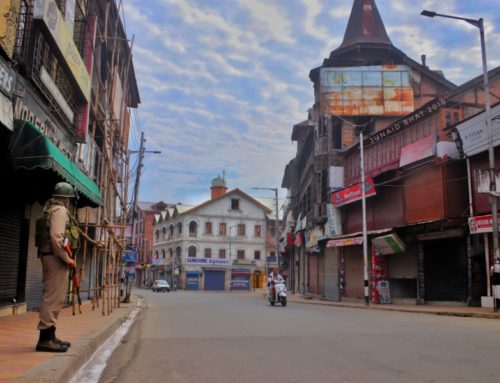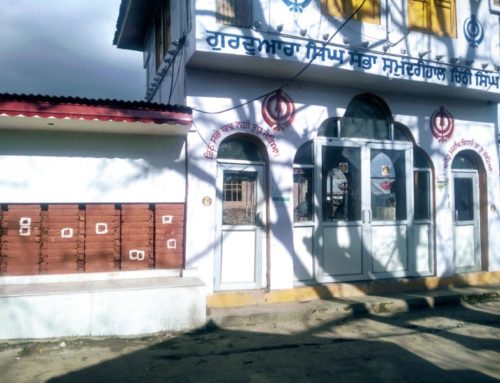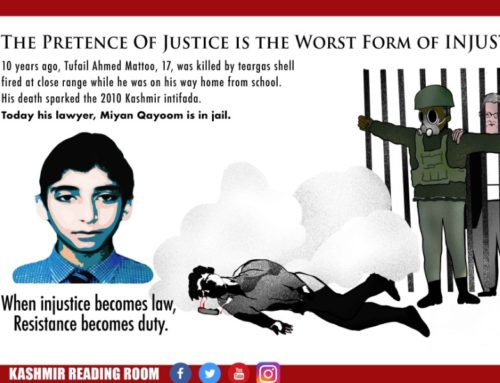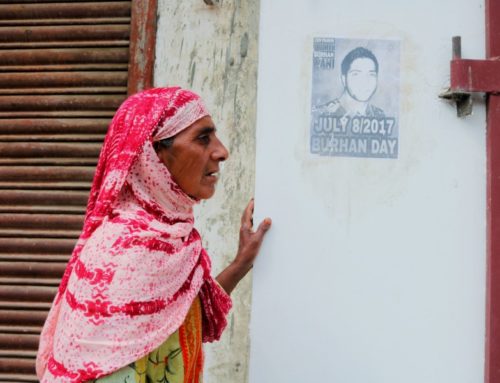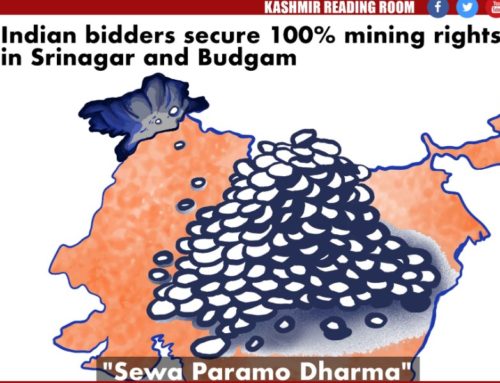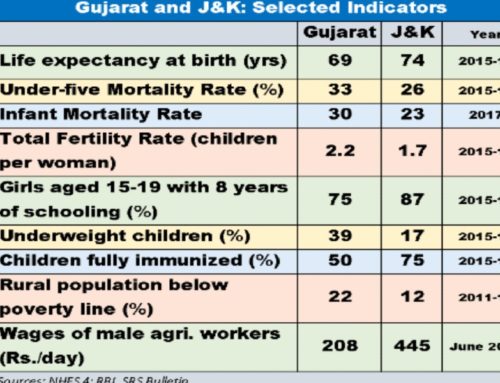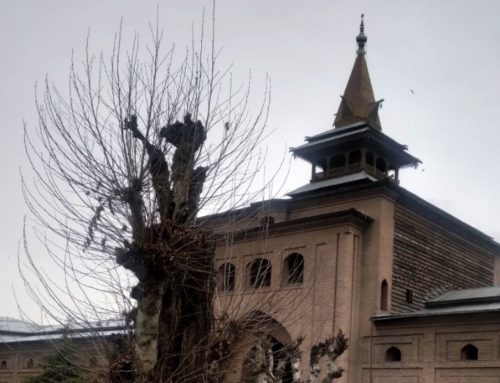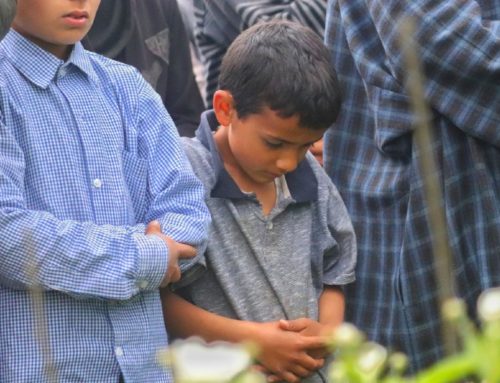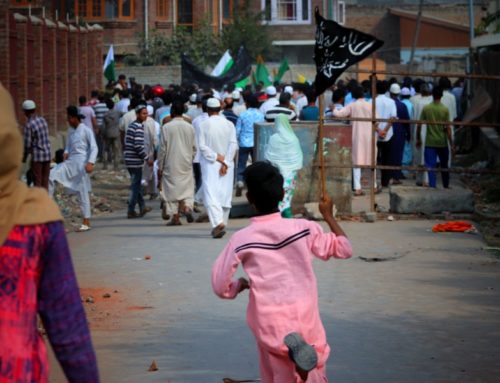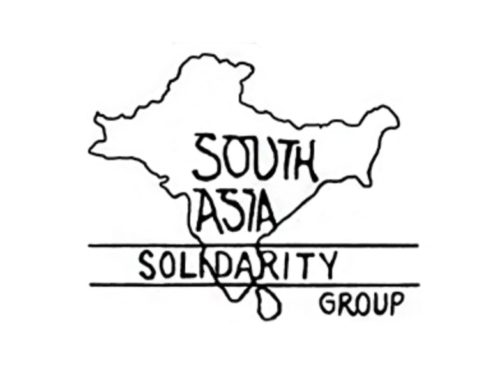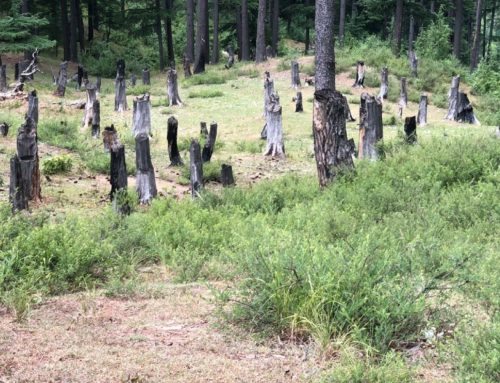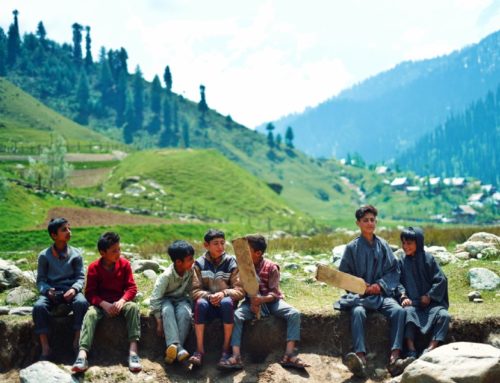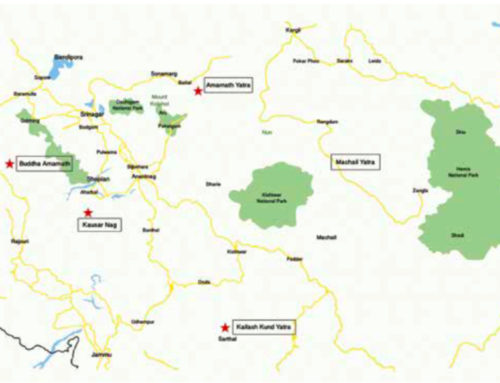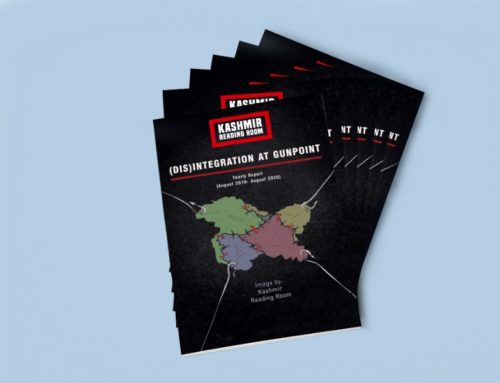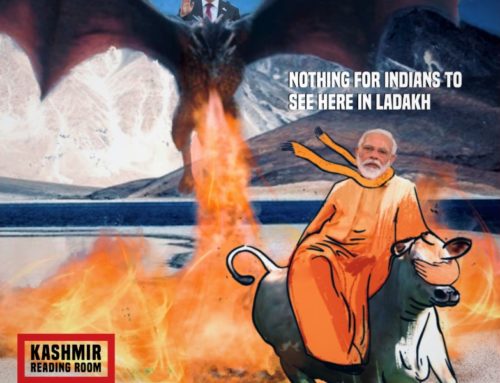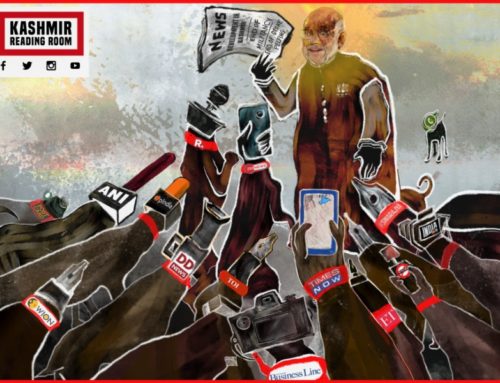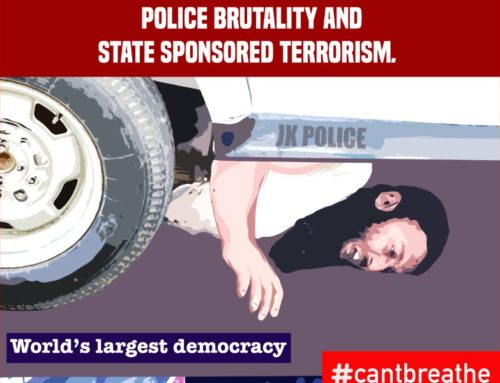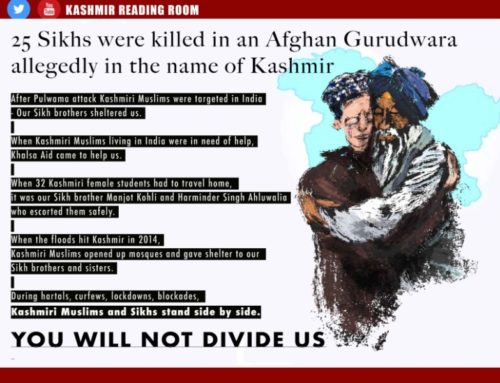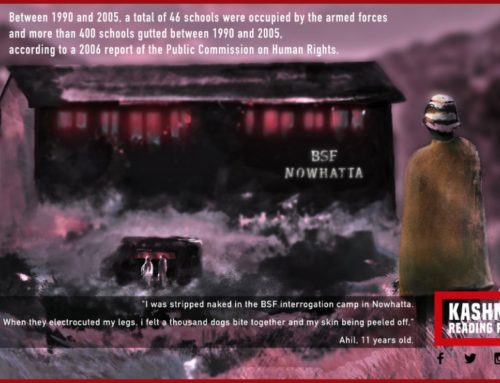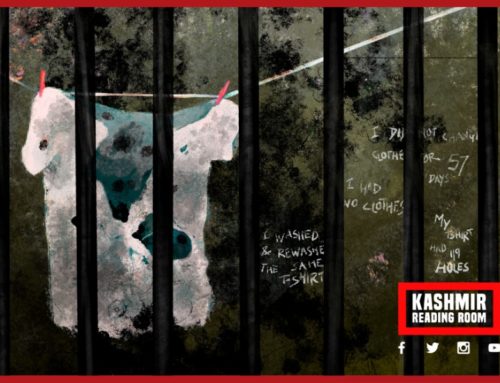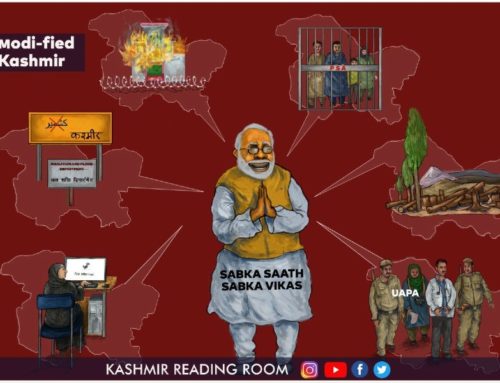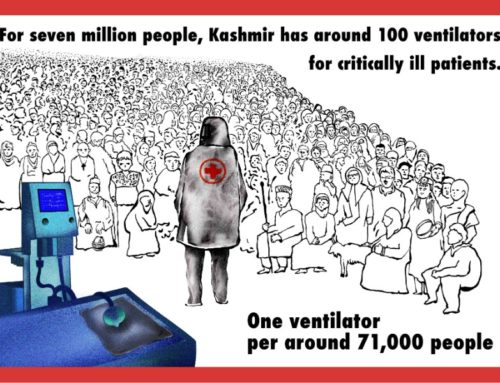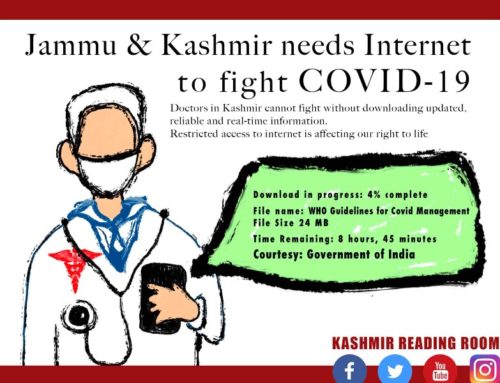Unilateral Integration, Global Pandemic and Declining Economy
An Overview of the economic situation of J&K by Kashmir Reading Room
The amendment to Article 370 was accompanied by severe restrictions on movement and communication in Jammu & Kashmir (J&K). These restrictions lasted for months and caused massive losses to the economy and the business community. In an interview with Kashmir Reading Room (KRR), Sheikh Ashiq, the President of Kashmir Chambers of Commerce and Industries (KCCI), estimates that the losses since August 2019 have reached INR 40,000 crore (USD 5.3 billion). Due to prolonged shutdown, businesses have gone bankrupt resulting in a spike in unemployment. This comes in the wake of an upcoming global recession when large parts of the world are reeling under two overlapping crises – one being the COVID pandemic and the other being a slump in the global economy.
The Indian government has used the COVID lockdown and consequent restrictions on public participation as an opportunity to introduce a slew of new policies in India. Labour laws were amended to dilute labour rights in many states of India, forest clearances have been granted without following procedural requirements and environmental laws are being amended to favour industries instead of preserving the ecology. Most of these actions appear to have been taken in a haste to push for legislative changes in the absence of public consultation and suspension of democratic participation. The stakeholders, who are most affected by these laws, have been kept out of the loop. A similar approach has been adopted while introducing the New Kashmir Policies of 2020 which include – Media Policy, Hydropower and Renewable Energy Policy, Real Estate Policy, Education Policy, Pharma Policy, New Industrial Policy, etc. Unilateral and non-participatory decision making appears to be the modus operandi of the present regime.
The history of development in the state of J&K demonstrates the emphasis placed on the social sector as the driver of the economy and the delivery of public goods. In the early years, the focus of the state government was infrastructural development and redistributive reforms – land reforms, massive debt waiver and reconciliation, restitution of mortgaged properties, health and educational reforms, etc. The focus of the state was ‘rights-based’ with special emphasis on benefitting the marginalized communities – scheduled castes, tribes, women and workers of the state. The bulk of resources that the state received (including resources from the Centre) were invested in developing the social sector as opposed to providing incentives to the private sector. The J&K was largely successful in achieving this as is evidenced by its better performance in Human Development Indicators (HDI) and low poverty rates. The state made a transition from the category of ‘Special Status’ in terms of backwardness in 1948 to the ‘General Category’ in the 1970s. The focus of the state on redistributive policies continued even in the 1980s. It is pertinent to note that carving out a separate path for development by the state administration was made possible as a result of the autonomy it had over its economic and administrative decision making.
Despite better performance in Human Development, due to many reasons, the economic growth in the region has been impacted in the past few decades. A major factor that affected its economic performance is the prolonged political turmoil and militarised conflict in the state.
With the introduction of New Economic Policies in J&K now, the focus is being shifted away from the ‘social’ or ‘public’ sector to incentivization of the private sector for developmental activities. Significant efforts are being made to invite and secure a place for Indian capital in the valley. In this regard, Kashmir Reading Room has interviewed the President of Kashmir Chamber of Commerce and Industries and an Indian trade unionist, Gautam Mody, to get their insights on the economic changes taking place.
Gautam Mody is the General Secretary of the New Trade Union Initiative (NTUI) of India. NTUI was formed when several independent trade unions in the organised and unorganised sector came together under the banner of the New Trade Union Initiative (NTUI) in the year 2001. It has built a democratic organization that now represents more than 1 million workers with a special emphasis on informal workers. Mody was also part of an eleven-member fact-finding team that visited Kashmir at the end of September 2019.
Prominent businessman Mr. Sheikh Ashiq was elected as the President of the Kashmir Chamber of Commerce and Industry in 2018. KCCI was constituted in 1924 by the prominent businessmen of Kashmir. The Kashmir Chamber of Commerce and Industry (Inc) is one of the oldest apex trade bodies in the subcontinent. Its major objective is to promote business, trade and economic relations. The Chamber continuously interacts with the Government of India and provides them feedback on bilateral issues relating to trade and investment.
Kashmir Reading Room Speaks with KCCI President, Sheikh Ashiq
KRR: How has the economic situation of J&K deteriorated after August 5, 2019, the ensuing lockdown and communication blockade? How has it been affected by the lockdown due to COVID pandemic?
SA: Actually, this all started on August 2, this advisory came from the J&K Government. The advisory instructed tourists and yatries to leave from the valley immediately as the situation was not safe. They warned that there were serious security concerns and non-locals started moving out of Kashmir, in view of this. Three days later, on August 5, Article 370 was amended, and everything was locked down. Subsequently, for months altogether, there was no business, no movement and it seemed like there was no life. It was not just for a day or two – I have been a witness to how long everything was shut.
After this, we were pushed into another lockdown due to the COVID pandemic. In Kashmir, administration had just resumed 10 days before the COVID lockdown was announced in India. Effectively, we never came out of the lockdown. We jumped from one lockdown to another. During the lockdown after August 5, we expected that there would be a revival by spring. We were hopeful that business will resume since we only have 6-7 months of business activity in Kashmir. Due to our climatic conditions, our highway is reliable for transport only for a few months. Rest of the months are unpredictable. Unfortunately, this year as spring approached, the pandemic caused everything to shut down again.
Regarding economic losses post-August, KCCI gave a ‘Preliminary Loss Report’ which was submitted to the J&K Government citing that we have suffered losses to the tune of 2.4 billion USD. KCCI also highlighted how around 4-5 lakh people lost their source of employment during this period. This report only took into consideration the first 120 days i.e. 4 months from August 5, 2019 to December 5, 2019.
This is not the first time that we are facing a lockdown, we have been through many lockdowns in the past. To be honest, in January or February we could open some shops, and transport services resumed as a few sectors were opened. However, our tourism industry was sick, our handicraft export was low, largely because of the internet shutdown which was still in place in February. The business community was just managing to get by, but now it has been almost a year since August 5, 2019. The internet is still restricted for Kashmiris allegedly because of security concerns. I don’t know how long it will take to restore ‘normalcy’, now that the whole world is going through this pandemic.
KRR: Could you give an estimate of losses after December 2019?
SA: When KCCI submitted the 120-day report from August 5 to December 5, 2019, we calculated everything that had been affected, and estimated a loss of USD 2.4 billion (INR 18,000 cr). Post the pandemic lockdown, according to our estimates, losses stand close to USD 5.3 billion (INR 40,000 cr). I shall elaborate with some rough estimates – the loss to the Indian economy per day has been estimated to be USD 4.64 billion. J&K contributes around 0.77% to Indian GDP, which comes down to INR 250 cr per day. The contribution of Kashmir alone is INR 130-140 cr per day.
Let us account for business of essential commodities alone. Everything is shattered or lost – bulk trade, the hotel industry and tourism related businesses are all closed and various other sectors have also been deeply affected.
Before the lockdown, our handicraft exports stood at INR 2000 cr but in the last year, we reached merely INR 900 cr. We don’t foresee a better situation in the coming year as well as demand may continue to be low. Joblessness in Kashmir has been a major issue. The Handicraft industry mainly employs women as it is a cottage/home-based industry. Therefore, we expect the women’s employment to be affected as well.
KRR: Can you tell us how daily wagers and the working population have been getting through in this period since there is no business activity?
SA: A few months after August 5, I started going around to observe the situation. I can say that we have faced a lot of stress during this year. I could see artisans, shikarawalas, and people associated with transport service started making their ends meet by doing odd-jobs – like selling barbecues, manual labour, etc. I spoke with a lot of people who were otherwise skilled but had no jobs and so they did whatever they could to survive. The gravity of the situation can be understood from the fact that at this point, their major concern was survival rather than economic activity.
KRR: The Investor’s summit that was planned has been postponed due to Covid-19. What do you see as the larger intent behind these initiatives? Do you expect investors to flock to Kashmir? How beneficial will this kind of investment be for our economy? Do you expect the benefits of this investment to reach the people in the state?
SA: Inviting investors to J&K was an idea that KCCI was a part of but it was conceived in 2018 before Article 370 was amended. We were also consulted at that time. We wanted to invite people to make collaborations with every sector so that young educated people can get more employment and opportunities. I remember that the TATA group came last year before revocation of autonomy and in March/April we had deliberations with them. They made it clear that they wanted joint collaborations in J&K. The amendment of Article 370 changed all this.
This investors summit was already planned and a budget of INR 50 cr was allocated for this. KCCI has always believed that if investment takes place in Kashmir, we will welcome investors here. However, people in the region feared that ownership of land in industrial estates will be given to outsiders. I would like to clarify – nobody owns land in industrial estates. Even the erstwhile permanent residents of the state could not own such land. Land in industrial estates could only be leased out before amendment to Article 370. However, now there is confusion.
Indian media has been highlighting that Indians can own the land, whereas, in fact, nobody can own the land in case of industrial estates. There was a story in the media about a one-rupee premium to get land on lease in Kashmir. This is misleading – when I as a Kashmiri businessman cannot get a lease for land at such a premium, how can non-Kashmiris get it at that price? We have raised these queries with the appropriate authorities as this is our job. How can you differentiate between an applicant from outside Kashmir and a resident of Kashmir? You cannot give the applicant a lease at a throwaway price. If that were to happen, it will definitely cause the value of local Kashmiri businesses to depreciate.
KRR: The lieutenant governor has plans to make Kashmir an ‘economic paradise’. Is that possible given the political situation in the valley? Do you think purchase of land by those outside the Union territory of J&K could lead to problems for investors given the resistance of the people of Kashmir valley?
SM: This is a very good question. We would like for Kashmir to be made an economic paradise, something everyone loves to hear. But let us examine the practical reality. We have not seen any economic progress for decades together – as opposed to other regions that have been developed. We have been lagging behind in this regard.
Coming to domicile law, after abrogation we have been divided into two union territories – Ladakh and J&K. But all acts/legislative changes are being implemented in J&K while nothing has been touched in the union territory of Ladakh. We don’t understand how it is possible that certain laws are applicable in J&K while the other part has been left out. It is something which our political parties should ask. I don’t know where they are and what they are doing. Our position is that we are an apolitical organization – we are apolitical by Constitution. These questions must be raised by political parties.
KRR: You mentioned that a lot of job losses have happened in the valley. Could you please elaborate? What kind of losses have the 10 districts of Kashmir faced because of the internet shutdown?
SM: Yes, there is a proper estimate. As I mentioned, it is around INR 40,000 Cr till now and the internet shutdown and restrictions have played a role in this. Due to lack of high-speed internet, our export industry has suffered, and it is further going to suffer in the coming days. We are experimenting with new ways, like virtual exhibitions among other things. However, in my opinion, post-COVID every export will be based on the internet. If your internet is slow, it may take hours just to upload a single file and you would lose out on opportunities.
KRR: How has the tourism industry been impacted? How will the new tourism policy affect tourism in the state? How does the new houseboats policy affect those who have been working in the sector?
SM: These policies are good. But what is the use of a policy if stakeholders are not consulted and are kept out of considerations? We have made our remarks public that due time should be given before the houseboat policy is approved. Same is the case with the tourism policy.
Last year there was no tourism in the valley. I don’t see any possibility of the same this year either.
KRR: A number of new policies have been introduced by the Central government in Kashmir in 2020. An emphatic push towards private investment is envisioned through these policies. Has there been any consultation with interested parties, or even KCCI? Or have these policies been introduced unilaterally in absence of an elected government?
SM: This time we have not been consulted. Earlier, when policies were drafted, given the procedural requirement, we were given time to deliberate. Our opinions and concerns were taken into consideration. We have raised objections on not being approached this time and we hope that in future we will be consulted on upcoming policies.
KRR: What has the COVID crisis revealed about the Health sector of J&K. Given the push towards private investment in the Health and Education sector, how do you see these areas changing?
SA: Education policy was recently renewed, and we have encouraged young people to come forward. In the health sector and health infrastructure we need people to come forward. The government has not updated our Healthcare system because of which we have been lagging. For an emergency situation, we do not have adequate infrastructure – ventilators, emergency beds, etc. In my opinion, Healthcare and Education needs complete support at this moment.
KRR: Do you see the situation improving now that Internet connectivity has been restored?
SA: In this past year, we have moved from one crisis to another. This lockdown is new to the rest of the world, but we have been under lockdown since August 2019. Our health situation is deteriorating and the frustration among the people is on the rise.
KRR: How would the economic situation of J&K change in future?
SA: Let me state this clearly, it is our right to get a financial revival package. People have suffered a lot, and unless we get the financial support, we are going to see an economic disaster in the valley.
KRR: Can you shed some light on what should be expected from the government? What kind of economic support should be offered to J&K?
SA: We have discussed certain things with the J&K government and the Union government as well. We tried to explain to them how we have suffered over years, particularly over the last one year.
Consider for example, the case of small-scale entrepreneurs who have a capital of INR 10 lakh. When they convert this capital into some commodity and this commodity is kept in store for close to a year (due to the lockdown) – this capital is lost. Now, my objective is to bring back their honor and respect which was snatched away from them.
If people want to start any business, they should be given capital at a very low interest rate. 30 years ago, loans up to INR 50,000 were waived off. This was done because at that time, the economic situation was very difficult for people. In my opinion, today the situation is even worse for the Kashmiri business community. For shikarawalas, auto drivers, artisans, weavers, such a step will prove to be a huge relief. They must ensure a life of respect and dignity for the poor.
KRR: Is there anything else you would like to add for our readers?
SA: At last I would say pray for Kashmir; Kashmir is in a very bad state.
Kashmir Reading Room Interviews Gautam Modi
KRR: The Lieutenant Governor has plans to make Kashmir an ‘economic paradise’. Is that possible given the political situation in the valley?
GM: The Lieutenant Governor enjoys extraordinary powers. By the decision taken on August 5, 2019, Government of India is responsible for converting not just the Kashmir valley but the entire erstwhile state of Jammu & Kashmir (J&K) into a living hell for its people. You can’t create an economic paradise by snatching people’s democratic rights away. The Lieutenant Governor must not merely engage in sloganeering. He must present a plan. Will this plan include free movement of people? Will there be freedom to communicate and freedom of speech? Will there be a just minimum wage so that people can live a decent life? Will there be freedom of association?
KRR: Do you expect investors to flock to Kashmir?
GM: It’s not improbable that outside businesses will invest in Kashmir. That is not the problem. I fear that J&K will receive predatory investment. Investors who are likely to invest in J&K are going to be politically connected sharks that make money from exploiting natural resources and cheap labour. This kind of predatory investment makes no quality or long-term investment and therefore contributes nothing to the community and society. These types of businesses are also typically based on significant capital subsidy from the government. So, we will have to really look very carefully at the policy when it is announced to see what kind of subsidy the government is offering.
KRR: How do you see the future of business in the region?
GM: There is no future of anything in J&K. People have effectively been jailed into their own homes, creative life has been wiped out, and an entire generation of young people have been silenced. There is no meaningful economic activity. There is no significant consumer demand. There are no new jobs. All jobs in the private sector have been completely destroyed by the draconian lockdown through this past year. When people see no future for themselves, what future will business have? Maybe there are a lot of opportunities for land sharks and hustlers. Maybe some super rich Indians are aspiring for their third or fourth homes in high security gated enclaves, protected by machine guns. But that is not economic activity, that is all about land grab.
India continues to reel under the economic effects of the pandemic lockdown which has still not been completely lifted. Every time there is news about how much the economy will shrink (between 2-3% points), the whole economy quivers. A year ago, when the Indian economy (GDP) was growing at about 5% there was consensus across the ideological divide that this was insufficient to propel the economy. There is also a consensus that pre-pandemic declining rates of growth in India are due to harsh and misguided policies put forward by the BJP government at the Centre over the past 6 years.
I say this because the region has faced political turmoil and economic distress since 2016. Following the lockdown of August 5, 2019, it is being suggested that the economy of J&K (GSDP) shrank by as much as 20% in the past year and will shrink at a similar pace in the next year. This means that by March 2021 the economy of J&K will be less than two-thirds or about 60% of what it was in April 2019. This will have grave implications on the consumption of basic goods, incomes and jobs for people and their general well-being. Is there any scope for businesses when the economy is in such rapid tailspin?
KRR: How do you see the new houseboats policy affecting the workers who have been doing this business for generations?
GM: Houseboats have been a part of the valley and especially Srinagar’s tourist cityscape for a century and a half. We are talking about something close to 950 houseboats. About 1000 workers are involved in managing and maintaining the houseboats throughout the year. 5000 workers are employed on the houseboats during the tourist season and 12,000-13,000 are indirectly employed providing goods and services to the houseboats during the season. If you add all this up, at least 20,000 families or 100,000 people derive their livelihood from houseboats. Now the houseboats have been shut for the past year. Has the government turned around to see what has happened to these hundred thousand lives? This is just one industry. It’s a symbol of what the lockdown has meant.
Now the government has announced a new houseboat licencing policy. New licencing norms require houseboats to meet high standards with respect to electricity, fire safety, water, sewage disposal, etc. Objectively speaking these are good standards. Houseboat owners are required to meet these standards in a small period of three months which effectively means – the houseboats will have to be substantially refurbished demanding significant expenditure. Who is going to bear these costs? The houseboat owners are not in a position to do so. Their businesses have been shut for a year.
Houseboat owners in J&K see this as an effort to push them out of business, force them into selling their boats at distress rates and replace them with large hotel chains and tour operators. Right now the houseboat policy does seem to be another mechanism to harass the people of J&K and to force the boat owners to sell their boats and quit their business.
Having said this, there has to be peace in the Kashmir valley for tourists to return. Only when tourists return, and peace is guaranteed will the houseboat owners invest afresh.
KRR: How do you see the opening of mining auctions for non-Kashmiris affect the local businesses?
GM: Let us not reduce it to Kashmiri versus non-Kashmiri issue. Problem arises when the government creates an entry barrier. Entry barrier is a cost, meeting standards in case of houseboats, or license fee or bid price in the case of the mine auctions. The threshold auction price was set so high that businessmen from J&K could not even bid for the mines. This is about creating an unequal field and using the government policy to push out one group to advantage another. This is not free movement of people – this is, in fact, just free movement of capital where big capital is given free rein to trample small local capital.
Since August 2019, the government has been actively using its penal powers and economic policy to transfer incomes and assets from the people of J&K to India’s bourgeois. This is a systemic policy. This is part of the BJP-RSS agenda. This includes impoverishing people who ascribe to the Islamic faith. This happened after the 2002 Gujarat pogrom. Muslim owned businesses were attacked during the pogrom and large number of them were later captured by Hindu owned business with the support of the BJP government in the state.
Destroying Muslim owned businesses and creating a coercive environment for asset transfer is a part of the ethnic cleansing project.
KRR: How do you see the working classes and the small and medium enterprises getting affected due to this push for privatisation through the New Economic Policies being introduced in Kashmir?
GM: It’s been a long time since the public sector has been at the service of the people in India. And especially under the BJP it has become a cash cow to beef up government revenues. In J&K the experience has been worse. When we visited Srinagar in September 2019, we found that the availability and non-availability of BSNL landline telephone was being used as a mechanism of coercion. Similarly, the State Bus Transport Corporation and the railways have been used to obstruct the free movement of people on the one hand, while the same have been used to scale up the movement of troops and paramilitary forces. When an entire people have been subordinated by the army and police and have been made to live under the barrel of the gun, how does anything matter?
KRR: Could you make a comment on the J&K Industrial policy of 2020 as well as the Real Estate Policy?
GM: I think in the Real Estate Policy, the government is just talking of state legislation under the Real Estate (Regulation and Development) Act 2016. This had been brought into J&K but then got repealed through the J&K Reorganisation Act 2019. Now, they have to legislate it for the Union Territory of J&K. The Indian government will now try to argue that through this policy, they have ‘liberated’ real estate in J&K. What it will effectively do is that it will ‘liberate’ J&Ks land from the people of J&K itself.
I find it instructive that the Union Home Minister announced that there will be a new Industrial Policy for J&K. This tells you where all decisions are made regarding J&K. A few days ago, the LG said that the policy was at its final stage. It’s nice that they are keeping us informed. Either the Union government or the J&K government has somewhere said that in the past 70 years there was only INR 39,000 cr worth of investment. By 2024, there will be four times this investment i.e., INR 156,000 cr. I don’t think we would stop the BJP from bringing INR 156,000 cr to J&K. But where will it come from? They are finding it difficult to ensure this level of investment in the whole of India. Who will invest in a place in 2020 where there is no internet?
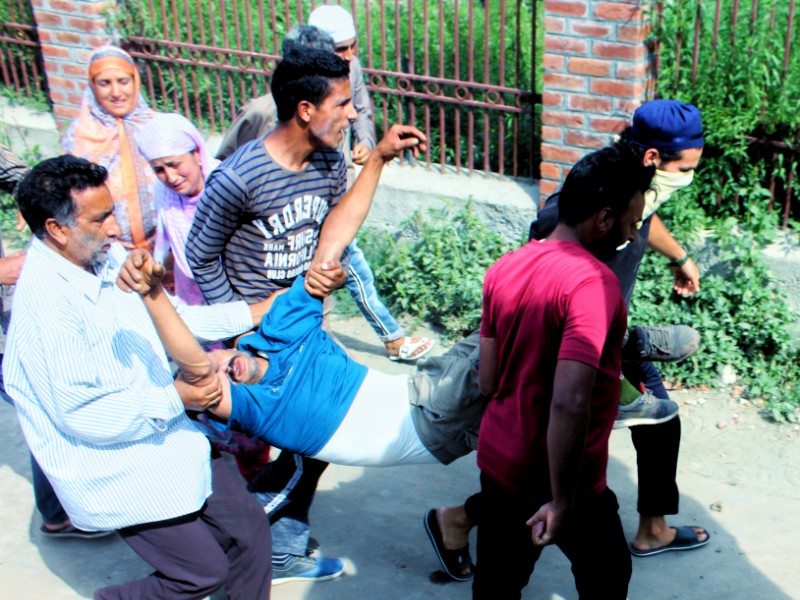
All our work is available free of charge, if you wish to support our work by making a donation, so that we can continue to provide this vital service, please do so here.
This opinion article forms part of Kashmir Reading Room’s Yearly Report Aug 2019-Aug 2020. You can view the full report by clicking on the button below.
Disclaimer
The author(s) of every article and piece of content appearing within this website is/are solely responsible for the content thereof; all views, thoughts and opinions expressed in all content published on this site belong solely to the author of the article and shall not constitute or be deemed to constitute any representation by JKLPP, Kashmir Reading Room, the author’s employer, organisation, committee or other group or individual, in that the text and information presented therein are correct or sufficient to support the conclusions reached.

